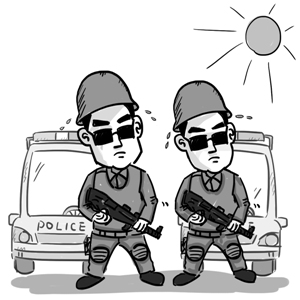METRO SHANGHAI / FENG YU'S COLUMN
Vigilance still needed despite heightened security

Illustration: Chen Xia/GT
A friend of mine was impatient and annoyed when she was stopped three times by different police officials in public venues Wednesday, including a park in Yangpu district and People's Square metro station, and asked to show her ID card. She sarcastically complained on WeChat that she didn't see why she seemed like such a bad guy in the eyes of the police.
Later I found that many people have had similar experiences, being randomly checked by police officials. A friend was asked to stop his car and open his trunk at the tollgate on the highway connecting Jiangsu Province and Shanghai.
People in Shanghai know this heightened security is because of the Conference on Interaction and Confidence Building Measures in Asia (CICA), which is to be held in the city on May 20 and 21.
Of course, we should not judge people by appearances, but with the large number of people being stopped, I think we can agree that the checks are being conducted at random. We must also remember that there are no obvious traits that mark someone out as a terrorist.
I read news articles and saw photos by my colleagues recording the day of large-scale counter-terrorist drills at Shanghai South Railway Station and Hongqiao transportation hub.
Police officials told media that they have learned lessons from the terrorist attacks in Kunming, Urumqi and in other places, where crowded venues are easy targets for attacks. The drills were organized to help prepare for any possible incident, and make sure police can reach the scene within minutes.
According to the reports, police officials from different departments coordinate their responses and are supported by police forces from neighboring cities. It's not an easy job to organize police from so many different departments and places.
On my way back home from work late at night, I saw a police vehicle every 3 kilometers on the elevated ring road. My taxi driver assumed that the heads of state who will be attending the CICA had already arrived. I said such leaders are so busy that they are unlikely to have come so many days before the conference.
We agreed the police presence was just part of preparations for the conference. It's obvious that authorities are working day and night and sparing no effort in preparing a safe CICA summit in Shanghai.
The stricter security checks in venues such as metro stations, long-distance bus stations, railway stations and airports will definitely be effective.
They will also put psychological pressure on those who may be planning to commit a terrorist act during this period.
On the other hand, we have to say that sometimes bad things have a good side. After the death of two firefighters in Xuhui district on May 1, a citywide campaign targeting group rentals is still ongoing.
We see news that law enforcement officials are demolishing illegally separated units inside apartments. We can assume that during this process, authorities will be vigilant and tackle any other concerns that come to light in their inspections.
My new colleague from Beijing noticed that metro riders in Shanghai are less willing to cooperate in security checks than their Beijing counterparts. He was surprised to see that still quite a portion of people avoid putting their bags through the scanner. This is particularly worrying at the time of such an important summit.
While these drills and heightened measures will help, we mustn't underestimate the intelligence of the terrorists. Before they take action, they will do a lot of homework to perfect a plan. The battle of wits between the terrorists and the authorities will never end.
In the long run, the experience gathered in preparing for this summit will greatly benefit the city and its people. The experience can also help other cities willing to host international forums and summits in the future.
The author is the managing editor of Global Times Metro Shanghai. fengyu@globaltimes.com.cn

